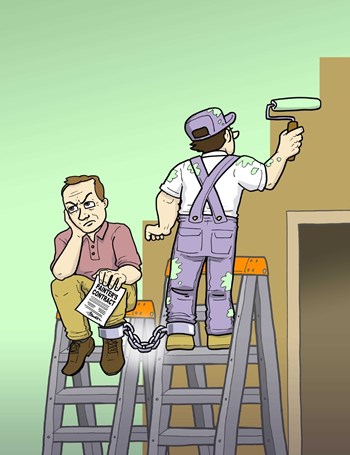
The vast majority of both one-time projects and long-term service contracts involving vendors and service providers and their condominium or HOA clients go smoothly and either conclude or continue without incident. However, a small percentage of jobs do jump the tracks in one way or another, and things can get complicated. Sometimes it’s a contractor’s inability to stay on schedule or stick to an agreed upon budget that does it; sometimes it’s the quality of work itself that’s not up to par. Whatever the cause, sometimes it’s necessary for condo administrators to pull the plug on a contract—and that sometimes can be easier said than done.
Breaking Ties
Before any contracts are signed, experts agree that an association administrator's priority is to make sure that all vendors and service providers are properly licensed and have a good record with the Better Business Bureau. For more information, log onto www.chicago.bbb.org or check with your county’s Clerk of Courts to determine whether the contracting firm or its principals appear in litigation. To find out when a contracting firm was formed, visit www.CyberDriveIllinois.com.
License and insurance aside, there are numerous reasons why a condominium or HOA manager or board might feel it necessary to terminate a contract with a vendor or service provider. “The most typical reason is for breach of contract,” says David Hartwell, a managing partner with the Chicago-based law firm of Penland & Hartwell. “If a vendor fails to uphold their end of the bargain, for example. Meaning they don’t do what they are supposed to do, they’re not performing services in a timely manner or they’re not performing the work properly. Associations or boards will try to work with a vendor first to try to resolve any issues, but for whatever reason, if the issues can’t be resolved then oftentimes they seek to terminate the contract.”
“The simple answer is that the vendor has simply not delivered the goods or services that they have been contracted for and there has been some type of communication breakdown where the association believes that the vendor is incapable or unwilling to fully perform under contract,” adds attorney Steven D. Welhouse of The Sterling Law Office LLC in Chicago. “And that’s why they would seek to terminate the contract.”
“The problem usually relates to the quality of work being done by the contractor,” says Mark Rosenbaum, a principal with the law firm of Fischel & Kahn in Chicago. “Anybody who signs a contract with you is a contractor. Sometimes the contractor doesn’t do things he’s supposed to, or doesn't do things in a timely fashion.”
Writing the Contract
In negotiating and writing a contract, an association board should draw upon advice from its manager and management company, attorney, and consultants—but the board makes the ultimate decision on the terms to which it will agree.
“The most important thing that associations need to do is have legal counsel review the contracts,” says Hartwell. “The contracts vendors have are very heavily weighted in favor of the vendor. If there are problems, the association can extricate themselves from the contract, [but] a lot of vendor contracts contain automatic renewal provisions, so they can be hard to get out of. For example, a laundry or cable vendor may have a five-year contract that automatically renews, and the provisions for how to get out of the agreement can be fairly onerous.”
“Associations should negotiate with vendors to include a very simple termination provision in the contract that would suit the given good or service being provided,” Hartwell continues. In some cases a 'cure provision' may be appropriate, wherein the association is required to provide some notice to the vendor of a problem, and grants the vendor a period of time to remedy the problem. In other situations, the termination provision should simply allow the association to terminate the service or goods delivery by the simplest means possible. The association may also want to consider using a 'hold back provision' in a contract that would allow the association to hold back a certain amount of the contract price pending their approval of the goods or service delivered.
“The best way to deal with contract issues is to have good legal representation before you sign the contract,” says Rosenbaum. “Many of the contracts that associations sign with vendors are form documents drawn up by the vendor, and those documents are in some cases egregious in favor of the vendor. If you have a contract going in that spells out each party's duties and rights, it makes the whole process so much easier in dealing with how to terminate the situation. Associations can be penny-wise and pound-foolish. They may not want to spend $250 for an attorney to review a contract, but then what if that contract blows up and then they have to spend thousands of dollars on an attorney—it’s not good for anybody.”
Other Considerations
Here are a few additional elements real estate experts believe that an association should seek to include when writing a contract:
• Termination for no cause, which could occur if the association board decides to get rid of a contractor it doesn’t like, if a new board or management company wants to replace the contractor with another it prefers, or if the board elects not to complete a project that is already underway. Then the association must pay the contractor for all costs and expenses he incurred prior to the termination.
• A default clause, which allows the association to cancel the contract if the contractor doesn’t cure a default within a specified time after notice by the association. The time to cancellation may be five, 10, or 30 days.
• A description of the work to be done, including a comprehensive scope of work statement, and a schedule of values containing a complete breakdown of quantities of materials and labor and their associated costs.
• A schedule that specifies three dates: when the work will begin, substantial completion, and final completion.
If Problems Arise
Hartwell believes that if a contract dispute develops, the board should first approach their management company. “If they are professionally managed they should go to their property manager and say ‘These are the issues we have, can you resolve this?’” he says. “If the issues aren’t resolved, then the next step is going to their legal counsel. Oftentimes, by the time they get to my office they don’t want to resolve the issues, they want to sever the relationship. So once that happens then you look over the contract to look for provisions for termination. There is also a common law provision that if one party breaches the contract—that alleviates the other parties’ burden of continuing to perform.”
Rosenbaum agrees with Hartwell. “If a dispute arises most associations have property managers,” he says. “What usually happens is that the property manager will complain to the contractor that something isn’t right. They’ll be some back and forth and then at some point the contractor will say ‘I’ve done what I said I was going to do,’ and the property manager will dispute that. Using the property manager doesn’t cost the association anything because they are usually on a fixed price per month as opposed to an attorney who’s going to charge per hour for their time. So what I first suggest to the associations is if they have a property manager, let them try to resolve the dispute. Obviously, you want to try to work it out.”
“The best course of action is to make sure the source of the problems is well-documented,” advises Welhouse. “Then communicate the association’s grievance to the vendor with as much documented support as possible.”
Most Contentious Contracts
Certain types of repairs and services are prone to contract disputes, construction-law attorneys say. Roofing jobs, concrete restoration and replacement of windows and sliding glass doors are known to generate disputes, as well as landscape maintenance and solid-waste collection.
“I would say contracts that have a significantly larger human element to them are more apt to disputes,” says Hartwell. “For example in a cable contract, once the cable is installed in the building and hooked up, there’s not much of a human element—no repair people on-site all the time. Alternatively, elevator maintenance has a significant human element to it. People are there every month, or every couple of weeks. Those are more prone to breach, because now you have somebody that can say 'This person didn’t do a good job,' and their side will say ‘We did do a good job, and we did exactly what we said we were going to do.' Sometimes there are mismatched expectations.”
“In my experience, snow removal and repair contracts are prone to disputes,” says Welhouse. “For example, if an association has had water infiltration, whether from a leaky roof, window units, or through exterior walls, it is not uncommon for the leaks to continue after repairs have been made. Sometimes water leaks are caused by a variety of sources and a repair of one defective condition may not remedy the entire problem. Property management contracts are also often the subject of disputes.”
In closing, dealing with contracts—including extricating your association from one that's no longer meeting your requirements or expectations—boils down to doing your homework beforehand, making your needs and standards clear (and making sure they make it into the language of the contract) and involving your legal counsel earlier in the process rather than later. Following this protocol will not only save you time and headaches, it will save your HOA money in the long run.
George Leposky is a freelance writer and a frequent contributor to The Chicagoland Cooperator. Staff writer Christy Smith-Sloman contributed to this article.






Leave a Comment